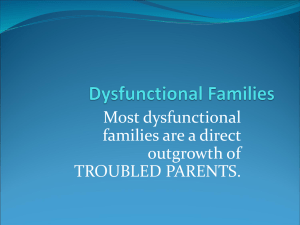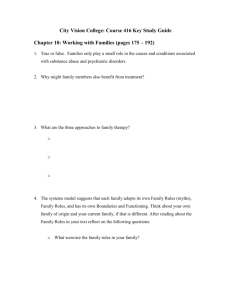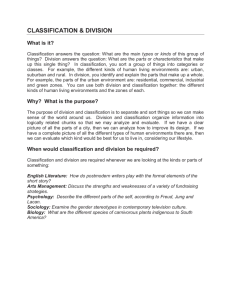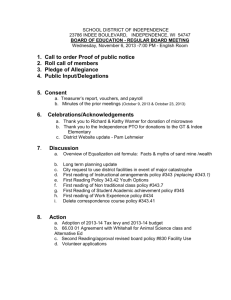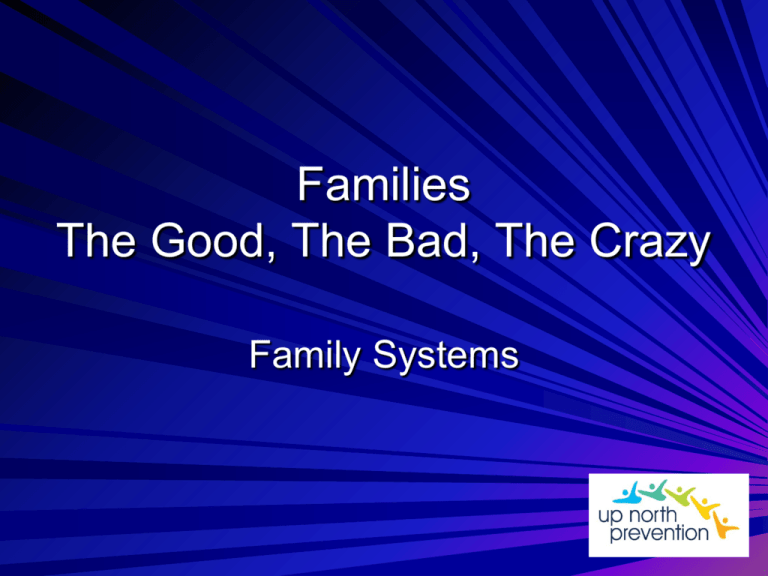
Families
The Good, The Bad, The Crazy
Family Systems
Quote
You may feel that your family or origin wasn’t dysfunctional
since your father wasn’t an alcoholic . . . . The truth is,
however, that, due to the fallen nature of all parents (and
children), all families are flawed and therefore dysfunctional
to a certain degree. Addictive and compulsive behaviors
(addictions to food, sex, work, and so on) are extremely
common in even “the best of families,” and such behavior is
almost always linked to some form of dysfunctional family
background.
–Dave Carder, et al.,
Secrets of Your Family Tree,
Chicago, IL: Moody Press, 1991) p. 15.
Family Systems
Individuals cannot be understood in
isolation from one another—families
are systems of interconnected and
interdependent individuals, none of
whom can be understood in isolation
from the system
What does it mean to say a family
is a system?
To understand this better,
consider the example of a
mobile.
When you move any one piece
of a mobile, all the other pieces
move too! They do not exist in
isolation from one another, and
“movement” in any one part of
the “system” will affect all the
rest of the parts of the system.
All Family Systems
Includes all extended family members.
It is more than the sum of it’s parts.
Have roles for each member.
Have rules and myths
Seek Homeostasis/Equilibrium.
Have a life cycle.
Terms from Family Systems
Theory that you’ll want to
understand
Family Roles--what is expected of each family
member
– The most basic types of roles are “father,” “mother,”
“aunt,” “daughter,” “son,” “grandmother,” etc. What is
expected from people in each of these roles?
– But there are also roles beyond this most basic level.
For example, one person may be the “clown” of the
family. Another person may be the “responsible one.”
One person may be the “emotional one.” Another role
might be “crazy uncle Joe” who everyone knows is
going to act odd in his own unique way. There are a
lot of different roles in families.
Activity - What was your role?
Every family has special interactional
patterns that are held in place by family
roles. Your role in your family was used to
fill special needs of your family, like a
catcher on a ball team fills the need of the
team to cover home plate. Roles are
assigned when we are young and we have
no choice on the role we are given.
FAMILY RULES
Family Rules are rules about how the family operates; these
rules are often unspoken. For example…
When people are angry at each other, do they express
this or keep it to themselves?
How affectionate or emotional are family members
expected or allowed to be with each other?
How do decisions get made in the family? Who has input
and who is expected to “just go along”? How is the final
decision made?
Are there limits on “how much” or in what ways kids can
argue with their parents?
How much are family members “allowed” to talk to people
outside the family about family problems?
Families tend to develop patterns about these sorts of things (&
other similar types of things). These patterns become
“unspoken rules.” Family members may see these things as
“just the way it is,” but different families do these things
differently from one another.
Family Myths
Myths are beliefs or illusions shared by the family
members. They are usually assumptions or
exaggerations which stretch reality and serve the
purpose of reinforcing the family rules…..Dad is
always right…we have the perfect family….we never
argue at our house….
Reflecting on Family Rules
Take a minute to think about how
you would answer the questions on
the preceding slide with regard to
your family!
Share information with your newly
formed family.
HOMEOSTASIS--EQUILIBRIUM
Systems develop typical ways of being which are reliable
and predictable. Family roles & family rules are examples
of what I mean by “typical ways of being.”
Whether these roles & rules are adaptive or not, there is a
pull from the system NOT to CHANGE—but to continue
functioning as things have always been.
Think of the mobile. If you move one part, the other parts
move. But if you let go of that one part, the whole
“system” (i.e., the parts of the mobile) will “pull each other”
back to the way they were before that one part moved.
This tendency of systems to keep doing things as they’ve
already been done is known as homeostasis or the
system’s equilibrium.
Causes of Unhealthy Family
Systems
Addictions –
– Chemical Dependence (drugs or alcohol addiction) –
Compelling need to take a drug even though it harms the body,
mind or relationship
– Other Addictions –
Eating disorders, workaholic, exercise, gambling, nicotine,
relationships, shopping, TV, thrill seeking
– What else can you be addicted to??
Perfectionism –
– Need to be accurate, parents overly critical of
themselves and their children
begin to feel inadequate & insecure
Causes con’t
Violence – Physical force to injure,
damage or destroy oneself, others, or
property
– Domestic Violence - occurs within family
– Physical Abuse – Harmful treatment that
results in physical injury to the victim
– Sexual Abuse – Sexual contact that is forced
on a person
– Emotional Abuse – Putting down another
person and making that person feel worthless
Causes con’t
Neglect –
– Failure to provide proper care and guidance
Abandonment –
– Removes oneself from those whose care is
one’s responsibility
– parents who abandon their children are not
available for them
Mental Disorders –
– Mental or emotional condition that makes it
difficult for a person to live in a normal way
Signs Of An Unhealthy Family
System
Family secrets
Blurred boundaries
Changing rules
Forbidden topics
Don’t talk to other people about our family
Denial
Don’t trust
Quote
First and foremost, children are taught to disown what their
eyes see and what their ears hear. Because of denial in the
family, children’s perceptions of what is happening become
progressively and systematically negated. Overtly or covertly,
explicitly or implicitly, they are told not to believe what their
own senses tell them. As a result, the children learn to
distrust their own experience. At the same time, they are
taught not to trust other people.
–Herbert L. Gravitz and Julie D. Bowden
Recovery: A Guide for Adult Children of Alcoholics,
(New York, NY: Simon & Schuster, 1985) p. 19.
What Elephant?
Family Roles - Enabler
An enabler is a
person who, acting
out of a sincere sense
of love, loyalty and
concern, does things
that ultimately help
the substance abuser
continue to use.
Enabling Behavior
Avoiding problems by trying to keep the
peace.
Denying that the person is using drugs or
is chemically dependent.
Keep their feelings inside.
Minimizing: "It's not that bad.”
Lecturing, blaming, or criticizing the
chemically dependent person
Enabling Behavior Cont.
Taking over his/her responsibilities.
Protecting the chemically dependent
person from pain.
Feeling superior; treating the dependent
person like a child.
Trying to control the dependent person.
Children’s Roles in the family
The Hero
This is the child who is "9
going on 40.“
Very responsible and selfsufficient.
They give the family selfworth because they look good
on the outside.
Good students, the sports
stars, the prom queens.
Adult Family Hero
Rigid and controlling
Self Judging
Achieve "success" on the outside, but
feels empty on the inside.
Often feels inadequate and insecure.
Make great enablers
The Scapegoat
Angry -most
emotionally honest
child in the family
He/she acts out the
tension and anger the
family ignores.
Distracts from the real
issues in the family.
Often becomes
pregnant or addicted
as teenagers.
Adult Scapegoat
Use anger to hide how sensitive and caring
they are which is why they feel such
tremendous hurt.
Can become very cynical and distrustful.
They have a lot of self-hatred and can be
very self-destructive.
this child often becomes the first person in
the family to get into some kind of recovery.
The Lost/Invisible Child
This is the child who is
never a problem.
They excel at being
‘out of sight’ and end
up being ‘out of mind’.
They can spend hours
daydreaming,
fantasizing, reading
watching TV or playing
video games.
Adult Lost Child
Second guesses self/no self trust
Uncomfortable in social situations
Very uncomfortable in the spot light
Most likely to end up in an abusive
relationship.
Also most likely to turn to substances so
they can connect to other people.
The Mascot/Charmer
Funny, charming
often the youngest.
Busy.. Busy..Busy
Often protected by
the family.
Uses humor to diffuse
ALL situations.
Flexible “goes with
the flow”
Adult Mascot
Has trouble handling conflict.
Can be a compulsive clown.
Has a great deal of anxiety.
Shirks responsibility.
Often looks for a family Hero for a mate
so they have a caretaker.
I Feel Invisible
Homeostasis & Equilibrium
Remember that we talked about how “systems”
are resistant to change?
According to systems theory, this is true EVEN
IF the change might seem to be a desirable one!
For example, if the “substance abuser” within a
family tries recovery the rest of the family --in
perhaps unintended, subconscious ways--sabotage the persons attempts to stop.
The whole family has to be willing to change.
The Family Defined
“Everything occurring in a family,
regardless of how carefully it may be hidden,
impacts the children. Everything.
Family Systems & The CulturalSystemic Approach
In conclusion, our Family Systems suggests
that sometimes our behavior may have AS
MUCH TO DO with the “systems” (groups) of
which we are a part—and the patterns that get
established within these systems-- as it may
have to do with the personality of each person
within the system.
Applying what you’ve learned!
Handouts
Other Good Books

